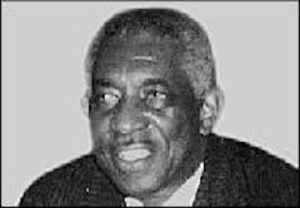
Edgar Brown
*Edgar G. Brown's birth is celebrated on this date in 1898. He was a Black activist, lobbyist, and journalist.
Born in Sandoval, Illinois, Brown was the eldest son of a family of eight children. George Washington Brown's father was a domestic worker for a prominent white-American family. Brown attended Northwestern University, but his studies were interrupted by his service in the Army during World War I. After his service, he returned to Northwestern and graduated with a degree in economics and business. After graduation, he worked as an advertising manager at the Madame C. J. Walker Co. in Indianapolis, as an editor of the Standard News of St. Louis, and as an administrative assistant and editor of the Federal Security Agency in Washington.
Brown married Paris Toomer in 1926, and they had two sons, Edward G. Brown and Frederick L. Brown. Toomer was a founding member of the Wake-Robin Golf Club for Colored Women in 1937. She was inducted into the United Golfers Association National Afro-American Hall of Fame in 1963 after serving as the group's long-time tournament director. Brown transitioned to the Civilian Conservation Corps (CCC) with assistance from his brother-in-law, Irvin H. McDuffie, who was President Roosevelt's valet. Although hired primarily to report on the activities of Blacks in CCC work camps, Brown also utilized his position to agitate for the improved status of Black CCC workers, such as increasing their numbers as camp commanders and medical officers.
Brown published a few brochures and press releases from the CCC, including "The Civilian Conservation Corps and Colored Youth." Upon the cessation of the CCC in 1942, President Roosevelt again intervened with the directors of the National Housing Agency and the Office of Price Administration to secure federal employment for himself. Brown worked to secure automatic promotions for federal custodial employees and campaigned successfully for the first language, specifically prohibiting racial discrimination in a 1940 civil service law.
After working for the CCC, Brown founded and directed the National Negro Council, a political lobbying organization. As suggested in his Associated Negro Press obituary, this was a controversial organization: "Brown always maintained he was the head of the National Negro Council, an organization for which he collected funds at many street corner gatherings. However, no one could obtain information about the group's membership and officers. Nevertheless, he did maintain an office in Washington as an official lobbyist of the organization." Despite the controversy, Brown enjoyed one key triumph in his lobbying efforts. Brown mobilized a campaign to have Senator Theodore Bilbo of Mississippi removed from office, claiming to have gathered over a million signatures on petitions for this cause.
Brown utilized unconventional means to broadcast his views, often acting as a street-corner orator or driving around in an automobile with a loudspeaker, according to his obituary by the Associated Negro Press. He was called a "bearded forerunner of black power" by Chicago broadcaster and journalist Warner Saunders, who remembered Brown as the Chicagoan most critical of racial discord in that city: "Edgar G. Brown, an exciting, fiery-tongued, street corner orator. I remember his soapbox decrying the white power structure and condemning the docility of blacks... Nearly all of his speeches had the same ending: Two burly, red-faced policemen giving him a free ride to jail."
Brown was also a four-time singles champion of the American Tennis Association in 1922, 1923, 1928, and 1929. He also co-founded and served as president of the National Lawn Tennis Association. He campaigned for the First Congressional District of Illinois in Chicago, running against the incumbent, William L. Dawson, whom Brown referred to as the "Black Apologist." In his campaign to unseat Dawson, Brown had the support of the Chicago Tribune. Edgar Brown died in 1954 while participating in the Republican primaries for Congress after sustaining a heart attack while driving.